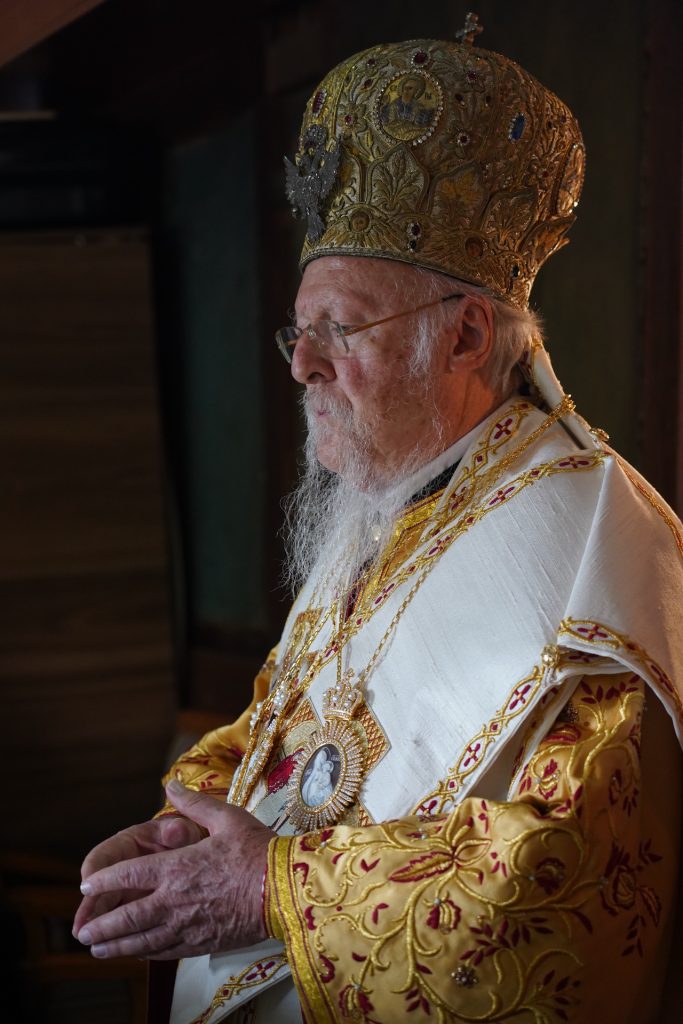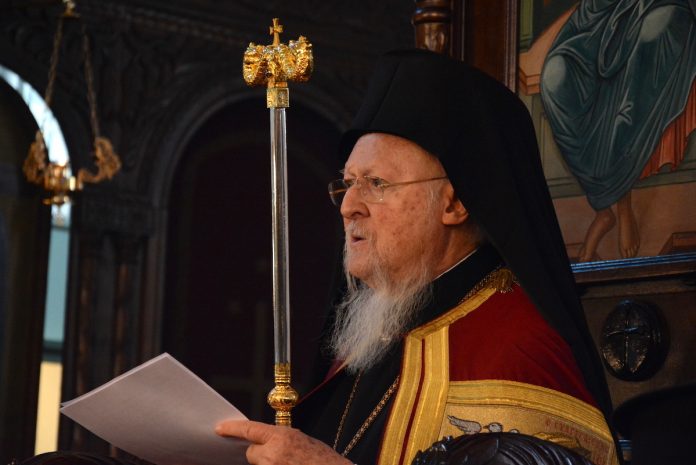+ Β Α Ρ Θ Ο Λ Ο Μ Α Ι Ο Σ
ΕΛΕῼ ΘΕΟΥ
ΑΡΧΙΕΠΙΣΚΟΠΟΣ ΚΩΝΣΤΑΝΤΙΝΟΥΠΟΛΕΩΣ – ΝΕΑΣ ΡΩΜΗΣ
ΚΑΙ ΟΙΚΟΥΜΕΝΙΚΟΣ ΠΑΤΡΙΑΡΧΗΣ
ΠΑΝΤΙ Τῼ ΠΛΗΡΩΜΑΤΙ ΤΗΣ ΕΚΚΛΗΣΙΑΣ,
ΧΑΡΙΣ ΕΙΗ ΚΑΙ ΕΙΡΗΝΗ
ΠΑΡΑ ΤΟΥ ΣΩΤΗΡΟΣ ΚΑΙ ΚΥΡΙΟΥ ΗΜΩΝ ΙΗΣΟΥ ΧΡΙΣΤΟΥ,
ΠΑΡ᾿ HΜΩΝ ΔΕ ΕΥΧΗ, ΕΥΛΟΓΙΑ ΚΑΙ ΣΥΓΧΩΡΗΣΙΣ
* * *
Τιμιώτατοι ἀδελφοί Ἀρχιερεῖς καί τέκνα ἐν Κυρίῳ εὐλογημένα,
Ἡ χάρις τοῦ Θεοῦ τῆς ἀγάπης μᾶς ἠξίωσε καί πάλιν νά εἰσέλθωμεν εἰς τήν ψυχωφελῆ περίοδον τοῦ Κατανυκτικοῦ Τριῳδίου καί νά φθάσωμεν εἰς τήν Ἁγίαν καί Μεγάλην Τεσσαρακοστήν, εἰς τό πλῆρες ἄνωθεν δωρημάτων καί σταυροαναστασίμου εὐφροσύνης στάδιον τῶν ἀσκητικῶν ἀγώνων. Κατά τό εὐλογημένον αὐτό διάστημα ἀποκαλύπτεται εὐκρινῶς ὁ πνευματικός πλοῦτος καί ὁ δυναμισμός τῆς ἐκκλησιαστικῆς ζωῆς καί ἡ σωτηριολογική ἀναφορά ὅλων τῶν ἐκφάνσεών της.
Πολλά ἐδιδάχθημεν ἤδη ἐκ τῆς ἀδιεξόδου καί αὐτοδικαιωτικῆς ὑπερηφανίας τοῦ Φαρισαίου, ἐκ τοῦ ἀγόνου ἠθικισμοῦ καί τῆς σκληροκαρδίας τοῦ πρεσβυτέρου υἱοῦ τῆς παραβολῆς τοῦ ἀσώτου καί ἐκ τῆς ἀναλγησίας καί τῆς καταδίκης ἐκείνων, οἱ ὁποῖοι ἠδιαφόρησαν διά τούς πεινῶντας, τούς διψῶντας, τούς ξένους, τούς γυμνούς, τούς ἀσθενεῖς καί τούς ἐν φυλακῇ «ἐλαχίστους ἀδελφούς» τοῦ Κριτοῦ. Ἐφανερώθη δέ εἰς ὅλους μας ἡ ἀξία καί ἡ ἰσχύς τῆς ταπεινώσεως καί τῆς μετανοίας, τῆς συγχωρητικότητος καί τῆς ἐλεημοσύνης, στάσεων, εἰς τήν καλλιέργειαν τῶν ὁποίων μᾶς καλεῖ μέ ἔμφασιν ἡ Ἐκκλησία κατά τήν ἀρχομένην περίοδον.
Ἡ Ἁγία καί Μεγάλη Τεσσαρακοστή εἶναι καιρός εὐπρόσδεκτος πνευματικῆς, ψυχικῆς καί σωματικῆς καθάρσεως καί γυμνασίας, διερχομένων, ὡς ἠκούσαμεν εἰς τήν πρό ὀλίγου ἀναγνωσθεῖσαν εὐαγγελικήν περικοπήν, διά μέσου τῆς νηστείας, ἡ ὁποία δέν ἐπιτρέπεται νά τηρῆται «πρός τό θεαθῆναι τοῖς ἀνθρώποις», καθώς καί διά τῆς συγχωρητικότητος πρός τούς ἀδελφούς: «Ἐάν ἀφῆτε τοῖς ἀνθρώποις τά παραπτώματα αὐτῶν, ἀφήσει καί ὑμῖν ὁ Πατήρ ὑμῶν ὁ οὐράνιος» [1]. Αὐτό ἐξ ἄλλου ὁμολογοῦμεν καθ᾿ ἡμέραν εἰς τήν Κυριακήν προσευχήν μέ τό «ὡς καί ἡμεῖς ἀφίεμεν τοῖς ὀφειλέταις ἡμῶν» [2].
Χθές, Σάββατον τῆς Τυροφάγου, ἡ Ἐκκλησία ἐτίμησε τήν μνήμην τῶν ἐν ἀσκήσει λαμψάντων Ἁγίων ἀνδρῶν καί γυναικῶν. Οἱ Ἅγιοι δέν εἶναι μόνον πρότυπα τῶν πιστῶν εἰς τόν καλόν ἀγῶνα τῆς ἐν Χριστῷ καί κατά Χριστόν ζωῆς, ἀλλά καί συνοδοιπόροι, φίλοι καί ἀρωγοί εἰς τόν ἀσκητικόν δόλιχον τῆς νηστείας, τῆς μετανοίας καί τῆς ταπεινώσεως. Δέν εἴμεθα μόνοι εἰς τήν προσπάθειάν μας, ἀλλά ἔχομεν εὐδοκοῦντα καί εὐλογοῦντα τόν Θεόν καί συμπαραστάτας τούς Ἁγίους καί τούς Μάρτυρας, μεσίτριαν δέ ὑπέρ πάντων ἡμῶν πρός Κύριον τήν Ἁγιόπρωτον Θεοτόκον. Ἡ ἁγιότης εἶναι τεκμήριον τῆς δυνάμεως τῆς χάριτος τοῦ Θεοῦ καί τῆς συνεργίας τοῦ ἀνθρώπου, ἐν τῇ Ἐκκλησίᾳ, διά τῆς μετοχῆς εἰς τά ἱερά μυστήρια καί διά τῆς τηρήσεως τῶν θείων προσταγμάτων. Δέν ὑπάρχει «ἀδάπανος εὐλάβεια» καί «εὔκολος Χριστιανισμός», οὔτε «πλατεῖα πύλη» καί «εὔχωρος ὁδός», ἀπάγουσαι πρός τήν οὐράνιον Βασιλείαν [3].
Ἡ Ἐκκλησία συνεχῶς μᾶς ὑπενθυμίζει ὅτι ἡ σωτηρία δέν εἶναι ἀτομικόν, ἀλλά ἐκκλησιαστικόν γεγονός, κοινόν ἄθλημα. Κατά τήν θεοσκέπαστον Ἁγίαν καί Μεγάλην Τεσσαρακοστήν, ἀποκαλύπτεται ἡ καθοριστική διά τήν πνευματικήν ζωήν τοῦ πιστοῦ σημασία τῆς μετοχῆς εἰς τήν ζωήν τῆς κοινότητος, εἰς τήν χριστιανικήν οἰκογένειαν καί τήν ἐνορίαν ἤ, ἀντιστοίχως, εἰς τό μοναστικόν κοινόβιον. Ἐπιθυμοῦμεν νά ἐξάρωμεν τήν λειτουργίαν τῆς χριστιανικῆς οἰκογενείας ὡς κοινότητος ζωῆς διά τήν βίωσιν τῆς πνευματικότητος τῆς Μεγάλης Τεσσαρακοστῆς. Ὁ ἐν Ἁγίοις προκάτοχος τῆς ἡμῶν Μετριότητος Ἰωάννης ὁ Χρυσόστομος ἀπεκάλεσε τήν οἰκογένειαν «Ἐκκλησίαν μικράν»[4]. Ὄντως, εἰς τήν οἰκογένειαν συντελεῖται ἐκκλησιοποίησις τῆς ὑπάρξεώς μας, ἀναπτύσσεται ἡ αἴσθησις τοῦ κοινωνικοῦ καί κοινοτικοῦ χαρακτῆρος τοῦ ἀνθρωπίνου βίου καί τῆς ἐν Χριστῷ ζωῆς, ἡ ἀγάπη, ὁ ἀλληλοσεβασμός καί ἡ ἀλληλεγγύη, βιοῦνται ἡ ζωή καί ἡ χαρά τῆς συμβιώσεως ὡς θεία δωρεά. Ἡ κοινή προσπάθεια ἐφαρμογῆς τοῦ ἐκκλησιαστικοῦ κανόνος καί τοῦ ἤθους τῆς νηστείας ἐν τῷ πλαισίῳ τῆς οἰκογενείας, ἀναδεικνύει τόν χαρισματικόν χαρακτῆρα τῆς ἀσκητικῆς βιοτῆς καί, εὐρύτερον, τήν βεβαιότητα ὅτι ὅλα τά ἀληθῆ, τά σεμνά καί τά δίκαια εἰς τήν ζωήν μας προέρχονται ἄνωθεν, ὅτι, παρά τήν ἰδικήν μας συνεργίαν καί συμβολήν, ὑπερβαίνουν, ἐν τέλει, τό ἀνθρωπίνως ἐφικτόν καί τά ἀνθρώπινα μέτρα. Ἐξ ἄλλου, ἡ κοινότης τοῦ βίου, ἡ οὐ ζητοῦσα τά ἑαυτῆς πρός ἀλλήλους ἀγάπη καί ἡ συγχωρητικότης δέν ἀφήνουν χῶρον εἰς τόν δικαιωματισμόν καί τήν αὐταρέσκειαν. Ἔκφρασιν αὐτοῦ τοῦ πνεύματος «κοινῆς ἐλευθερίας» καί εὐχαριστιακοῦ ἀσκητισμοῦ ἀποτελεῖ ἡ ἀδιάσπαστος σύνδεσις νηστείας, φιλανθρωπίας καί μετοχῆς εἰς τήν ἐνοριακήν καί λειτουργικήν ζωήν τῆς Ἐκκλησίας. Ἡ βίωσις τοῦ «σαρακοστιανοῦ κλίματος» εἰς τήν χριστιανικήν οἰκογένειαν ὁδηγεῖ εἰς τό βάθος τῆς ἀληθείας τῆς ἐκκλησιαστικῆς ἐμπειρίας καί ἀποτελεῖ κοιτίδα καί ἀφετηρίαν χριστιανικῆς μαρτυρίας εἰς τήν ἐκκοσμικευμένην σύγχρονον κοινωνίαν.
Εὔχεσθε, ἀδελφοί καί τέκνα, νά διατρέξωμεν ἅπαντες μέ ἔνθεον ζῆλον τό στάδιον τῆς Ἁγίας καί Μεγάλης Τεσσαρακοστῆς ἐν νηστείᾳ καί μετανοίᾳ, ἐν προσευχῇ καί κατανύξει, εἰρηνεύοντες ἐν ἑαυτοῖς καί μετ᾿ ἀλλήλων, κοινωνοῦντες τήν ζωήν, ἀναδεικνυόμενοι «πλησίον» τῶν ἐν ἀνάγκαις ἐν ἔργοις φιλανθρώποις, συγχωροῦντες ἀλλήλοις καί δοξολογοῦντες ἐν παντί τό ὑπερουράνιον ὄνομα τοῦ Θεοῦ τοῦ ἐλέους, δεόμενοι Αὐτοῦ ὅπως εὐδοκήσῃ νά φθάσωμεν κεκαθαρμέναις διανοίαις τήν Ἁγίαν καί Μεγάλην Ἑβδομάδα καί νά προσκυνήσωμεν ἐν χαρᾷ καί ἀγαλλιάσει τήν λαμπροφόρον Ἀνάστασίν Του.
Ἁγία καί Μεγάλη Τεσσαρακοστή ͵βκδʹ
† Ὁ Κωνσταντινουπόλεως
διάπυρος πρός Θεόν εὐχέτης πάντων ὑμῶν
__________
1. Ματθ. στʹ, 14.
2. Ματθ. στʹ, 12.
3. Πρβλ. Ματθ. ζʹ, 13-14.
4. Ἰ. Χρυσοστόμου, Ὑπόμνημα εἰς τήν πρός Ἐφεσίους ἐπιστολήν, κʹ, PG 62, 143.
———————
Ἀναγνωσθήτω ἐπ᾿ ἐκκλησίας κατά τήν Κυριακήν τῆς Τυρινῆς, ιζʹ Μαρτίου, ἀμέσως μετά τό Ἱερόν Εὐαγγέλιον.
Catechetical Homily at the Opening of Holy and Great Lent (2024)

+ BARTHOLOMEW
BY GOD’S MERCY
ARCHBISHOP OF CONSTANTINOPLE-NEW ROME
AND ECUMENICAL PATRIARCH
TO THE PLENITUDE OF THE CHURCH,
MAY THE GRACE AND PEACE
OF OUR LORD AND SAVIOR JESUS CHRIST,
TOGETHER WITH OUR PRAYER, BLESSING AND FORGIVENESS
BE WITH ALL
* * *
Most honorable brother Hierarchs and blessed children in the Lord,
The grace of our God of love has once again vouchsafed for us to enter the soul-benefiting period of the Lenten Triodion and arrive at Holy and Great Lent, namely to the arena of ascetic struggle replete with gifts from above and the joy of the Cross and Resurrection. During this blessed period, the spiritual treasure and dynamism of the ecclesiastical life as well as the soteriological reference of all its expressions are revealed with clarity.
We have already learned much from the impasse and self-righteous arrogance of the Pharisee, from the barren moralism and hard-heartedness of the elder son in the Parable of the Prodigal Son, and from the callousness and condemnation on the Day of Judgment of those who proved indifferent to the “least of our brothers” that were hungry, thirsty, foreigners, naked, ill, and imprisoned. Moreover, the value and power of humility and repentance, of forgiveness and mercy were revealed to us as attitudes that the Church emphatically calls us to nurture in the period that opens up before us.
Holy and Great Lent is a welcome time of spiritual, inner and physical purification and discipline, which—as we just heard in the Gospel passage that was read—traverses through fasting, which should not be practiced “so that others may see,” and through forgiveness of our brothers and sisters: “For if you forgive men their trespasses, your heavenly Father also will forgive you” (Mt. 6.14). After all, this is what we confess each day with the Lord’s Prayer, when we say: “as we forgive the sins of our debtors” (Mt. 6.12).
Yesterday, on Cheesefare Saturday, the Church honored the memory of the saintly men and women who shone in ascetic life. Saints are not only models for the faithful in the good fight of life in Christ and according to Christ. They are also our fellow travelers, friends and supporters in the ascetic journey of fasting, repentance, and humility. We are not alone in our effort, but we have God, who encourages and blesses us, as well as the Saints and Martyrs, who stand beside us, and above all the First among the Saints and Mother of God, who intercedes for us all to the Lord. Sanctity is proof of the power of divine grace and the human synergy in the Church, which takes place through participation in the holy sacraments and fulfilment of the divine commandments. There is no “gratuitous piety” or “easy Christianity,” just as there is no “wide gate” or “spacious way” that leads to the heavenly Kingdom (cf. Mt. 7.13–14).
The Church constantly reminds us that salvation is not an individual, but an ecclesiastical event, a common discipline. During the God-guarded Holy and Great Lent, what becomes apparent for the spiritual life of the faithful is the definitive meaning of participation in the life of the community—that is to say, in the Christian family and parish, or else in the monastic coenobium. We would like to highlight the function of the Christian family as a community of life for the experience of Great Lent’s spirituality. Our predecessor among the Saints, John Chrysostom, described the family as “a small Church.”[1] Indeed, it is in the family that occurs the rendering of our existence into that of the church; it is there that the sense of the social and communal character of human life and the life in Christ as well as the love, mutual respect and solidarity are developed; and it is there that the life and joy of cohabitation are experienced as a divine gift.
The joint endeavor to apply the ecclesiastical rule and ethos of fasting in the context of the family manifests the charismatic dimension of ascetic life and, more broadly, the conviction that whatever is true, honorable, and rightful in our life comes to us from above; that despite our own cooperation and contribution, in the end they transcend whatever is humanly achievable and accessible. After all, the communal aspect of life, the love for one another that does not seek its own, and the virtue of forgiveness, do not allow room for human rights-ism and complacency. An expression of such a spirit of “common freedom” and eucharistic asceticism is precisely the inseparable connection between fasting, charity, and participation in the parish and liturgical life of the Church. Living out this “Lenten spirit” within a Christian family leads us to the depth of truth in the ecclesiastical experience and constitutes the birthplace and source of Christian witness in our secularized contemporary world.
Brothers and children, pray that we may all travel with godly zeal along the way of Holy and Great Lent with fasting and repentance, in prayer and contrition, making peace within ourselves and with one another, sharing in life and showing ourselves to be “neighbors” to those in need through charitable works, forgiving one another and glorifying in all circumstances the God of mercy’s name, which is above the heavens, beseeching Him to deem us worthy of reaching Holy and Great Week with purified minds and of worshipping with joy and delight His splendid Resurrection.
Holy and Great Lent 2024
✠ BARTHOLOMEW of Constantinople
Fervent supplicant for all before God
________
1. Commentary on the Letter to the Ephesians 20, PG 62.143.
————–
To be read in churches on Cheesefare Sunday, March 17, 2024, immediately after the Holy Gospel.

